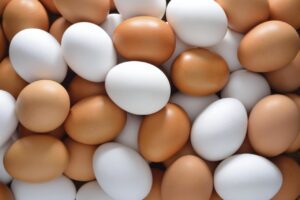
Ukraine and Poland have overtaken the Netherlands to become the largest suppliers of eggs to the UK in 2025, prompting criticism of imports of “cage” eggs, which have been banned in the UK since 2012. This was reported by The Guardian newspaper.
According to the UK’s Animal and Plant Health Agency, Ukraine has exported 8 million kg of eggs to the country since the beginning of the year, Poland has exported almost 7 million kg, and Spain has exported about 5 million kg.
Despite the overall decline in tonnage, the number of shipments has increased — instead of large batches, many small batches began to be exported from countries where cage farming is still common.
Mark Williams, chairman of the British Egg Industry Council, said that British producers are at a disadvantage because they have to invest in stricter standards for keeping birds. At the same time, imported eggs from Ukraine and Poland come from systems that are banned in the UK. He called this “morally wrong” and called on the government to take measures to protect the domestic market.
Egg imports are mostly destined for the catering and food industry segments, rather than supermarkets (where British Lion-labeled eggs dominate). It is estimated that the UK produces about 88% of its own eggs, importing the remaining 12%.
The British government has stated that it is involved in working on new regulations to level the playing field for domestic producers. At the same time, tariff exemptions for Ukraine were extended for many goods after the start of the war, but the “eggs and poultry” category received only a short-term deferral.
Source: https://open4business.com.ua/ukrayina-stala-najbilshym-postachalnykom-yayecz-do-velykoyi-brytaniyi/
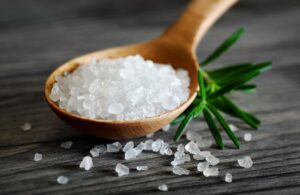
In January-June 2024, Ukraine imported 211,692 thousand tons of salt, which is 45.88% less than in the same period a year earlier, when external purchases amounted to 391,186 thousand tons.
According to statistics released by the State Customs Service (SRS), spending on salt purchases on foreign markets in the first half of 2025 decreased by 48.46% to $26.919 million, compared to $52.225 million in the same period of 2024.
The main suppliers of salt to Ukraine in January-June were Egypt, which accounted for 46.09% of supplies, worth $12.407 million, Turkey (17.57% and $4.730 million) and Romania (13.41% and $3.611 million)..
A year earlier, the top three salt suppliers were the same: Egypt (54.89% or $28.668 million), Turkey (17.15% or $8.956 million) and Romania (14.69% or $7.671 million).
As reported, Ukraine exported 710,040 tons of salt worth $28.32 million in pre-war 2021, while in 2022, exports fell fivefold in real terms to 142,038 tons, and revenues fell even more sharply to $3.82 million. The main buyers of Ukrainian salt in 2021 were Poland (39.1%), Hungary (27.4%), and Romania (7.3%). In 2021, Ukraine imported 142,810 tons of salt worth $12.92 million.
After the occupation by Russian troops in April 2022 of the country’s largest salt producer, Artemsol, Ukraine virtually stopped its exports and became a net importer.
The Tereblya salt deposit (Zakarpattia region) resumed salt production in August 2023. The head of the Zakarpattia Regional State Administration, Viktor Mykyta, said that Zakarpattia would be able to provide Ukraine with 100% of its technical and table salt.
The Dolinsky deposit (Ivano-Frankivsk region) plans to resume salt production in the near future. Work is currently underway on the Dolinsky deposit development project, and a thorough environmental impact assessment is being conducted. Specialists from the State Scientific Research and Design Institute of Basic Chemistry “Niochim” are preparing a design solution for a future salt production plant. A special permit for the extraction of rock salt (halite) in 2023 was obtained by the Kharkiv-based company “Planeta Komfort.”
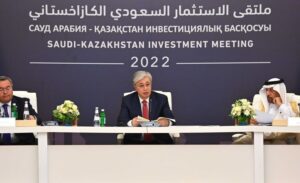
The agricultural sector of Kazakhstan has great potential and can become one of the long-term suppliers of high-quality wheat and oilseeds to Saudi Arabia, President of the Republic Kassym-Jomart Tokayev said.
“Kazakhstan ranks second in the world in terms of arable land per capita and fifth in terms of pasture resources (180 million hectares). Our country is one of the 10 largest producers of wheat and flour. We are ready to become one of the stable, long-term suppliers of high-quality wheat, flour and oilseeds to the kingdom,” Tokayev said, speaking at an investment round table with representatives of the business community of Saudi Arabia on Sunday in Jeddah.
KAZAKHSTAN, OILSEEDS, SAUDI ARABIA, SUPPLIER, Tokayev, WHEAT
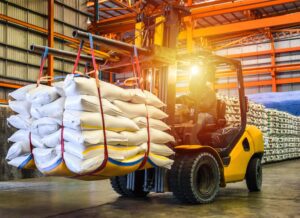
Ukraine can become a better supplier of raw materials and components for future technologies for Europe than China, Vice-President of the European Commission for Interinstitutional Relations and Foresight Maroš Šefčovič has said.
“I think you can do better than China. I understand the President, the Prime Minister and your business leaders who want to ensure that Ukraine builds an entire vertically integrated value chain around critical raw materials and that as much value added as possible remains in Ukraine […] Ukraine clearly could be the key supplier of raw materials and components for these future technologies for Europe,” Šefčovič said in an interview with Interfax-Ukraine.
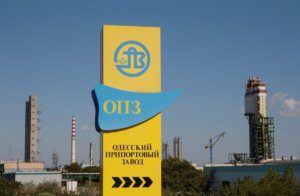
Odesa Port-Side Plant in October would announce a new tender to select a supplier of natural gas for processing on tolling terms, acting Head of the State Property Fund (SPF) of Ukraine Vitaliy Trubarov has said.
“As are as I understand, the tender will be announced again next month and maybe there are economic entities, possibly foreign ones, that could supply their own gas, and the enterprise could operate,” he told journalists in Odesa on the sidelines of the Ukrainian Financial Forum organized by the ICU investment group.
The head of the SPF said that the final decision on the tender is taken by the company management, since representatives of the SPF are members of the supervisory board and do not have the right to interfere in the economic activities of the enterprise.
Trubarov said that in the current market conditions, the attraction of the supplier of gas on tolling terms is the only opportunity of operating for Odesa Port-Side Plant, since “gas that occupies more than 90% of the production cost is quite expensive, and the prices for end products are subsiding.”
According to him, the conditions of the tender to select the company are absolutely open, and the difficulty to select it is the absence of a large number of interested companies.
He said that the SPF is extremely interested that the plant is operating at the time of the privatization work.
“Our task in this matter is to build the work in a way that at the time of sale this asset was operating, alone or with the help of a supplier of natural gas for processing on tolling terms, but operating. Selling an idle enterprise, in my opinion, is a double problem,” the SPF head said, recalling the even more complex problem of toxic debts of the Odesa Port-Side Plant to the structure of Dmytro Firtash.